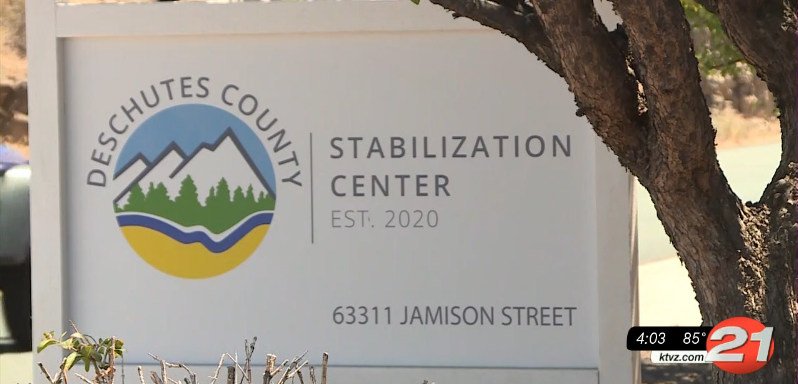
Warm Springs also receives criminal justice-behavioral health grant
BEND, Ore. (KTVZ) -- The recently opened Deschutes County Stabilization Center has received a $2.4 million state grant that will allow the facility, a place for people experiencing mental health crises, to expand to 24/7 operation.
The facility to this point has been open from 7 a.m. to 9 p.m. weekdays. The expanded hours will help at a time when area shelters are at capacity amid the COVID-19 pandemic.
"We're not turning anyone away," said Holly Harris, a program manager with Deschutes County Behavioral Health.
"If someone shows up here in crisis, we're going to serve them. We ask that they wear a mask. We wear them all day long. and really we haven't had too much compliance issue with that. Most clients just really want to get the help, so they're willing to wear a mask while we do that."
The funding also will allow the facility to hire a case manager and a peer support specialist, a person who has experienced addiction or mental health issues, so they can relate to clients' issues.
For more details: https://www.deschutes.org/health/page/crisis-services
News release:
OHA, CJC announce nearly $10 million in funds to improve criminal justice, behavioral health outcomes
SALEM, Ore. (KTVZ) -- Last week, the Oregon Health Authority (OHA) and Oregon Criminal Justice Commission announced awards totaling $9.7 million to six counties and five tribal governments. The funding will help people with mental illnesses and substance use disorders get the treatment they need, and avoid frequent and costly visits to Oregon emergency departments and involvement with the criminal justice system.
Oregon has one of the highest rates of people with behavioral health needs in the United States. In July 2019 Governor Kate Brown signed legislation creating a grant program to support counties and tribal nations in developing stronger community based continuums of care. The Improving People’s Access to Community-based Treatment, Supports, and Services (IMPACTS) grant program is expected to help reduce millions in local and state expenditures resulting from jail admissions and an overwhelming number of court orders for people to competency restoration at Oregon State Hospital.
"With little opportunity for social distancing in jails, the COVID-19 outbreak has reinforced the importance of community-based assistance for people with mental illnesses and substance use disorders," said Steve Allen, Behavioral Health Director for OHA and co-chair of the IMPACTS Grant Review Committee. "Investing in innovative local programs will help us learn more about what works in improving health outcomes and decreasing costly justice system involvement for people with complex behavioral health needs."
The funding will help address a shortage of supports and services in local communities, from supportive housing to crisis stabilization units to medication and care coordination. The jurisdictions receiving funding will also provide data on key outcome metrics for people being served with grant funds to inform statewide and local policy decisions regarding continued investment.
"People battling behavioral health challenges are often removed from their communities as they shuttle between hospitals, jails and prison, finding themselves in settings that are least able to meet their needs. This funding will help provide additional resources, including effective treatment and services, to support them in their communities," said Karen Cann, programs director for the CJC and co-chair of the IMPACTS Grant Review Committee. "Lessons learned from these jurisdictions will develop a path forward to serve this population more effectively statewide."
Jurisdictions selected to receive IMPACTS funding, 20% of which was reserved for tribal governments, include:
- $2,527,697 for Lane County.
- $2,403,519.52 for Deschutes County.
- $1,431,085.59 for Douglas County.
- $691,582.50 for the Klamath Tribes.
- $562,945.27 for Union County.
- $499,987.52 for Clackamas County.
- $404,024.50 for the Cow Creek Band of Umpqua Tribe of Indians.
- $317,699.82 for the Confederated Tribes of Coos, Lower Umpqua and Siuslaw.
- $289,999.96 for the Confederated Tribes of Grand Ronde.
- $288,490 for Lincoln County.
- $282,968.36 for the Confederated Tribes of Warm Springs.
"Helping our tribal communities safely divert people with behavioral health needs from continual emergency room visits and arrests has never been more important for Oregon’s tribes," said Dr. Sharon Stanphill, who serves as the chief health officer for the Cow Creek Band of Umpqua Tribe of Indians and is a member of the IMPACTS Grants Review Committee. "This funding will make a huge difference as our tribal leaders and staff know culturally specific prevention and treatment services are critical for our members."
In the summer of 2018, Oregon state and county leaders partnered with The Council of State Governments Justice Center to use a data-driven Justice Reinvestment approach to evaluate issues related to behavioral health and the criminal justice system. The project was guided by Oregon’s 32-member Behavioral Health Justice Reinvestment Steering Committee, which recommended the creation of the IMPACTS grant program.
More than 30 states have successfully used the Justice Reinvestment approach to date, with each state tailoring the process to help address particularly challenging issues within their criminal justice systems. Oregon is the first state to focus its Justice Reinvestment efforts entirely on the intersection of the criminal justice and behavioral health systems.
"allow" - Google News
July 16, 2020 at 10:05AM
https://ift.tt/3etmxQ0
State grant to allow 24/7 expansion of Deschutes County Stabilization Center - KTVZ
"allow" - Google News
https://ift.tt/2KTEV8j
https://ift.tt/2Wp5bNh
Bagikan Berita Ini















0 Response to "State grant to allow 24/7 expansion of Deschutes County Stabilization Center - KTVZ"
Post a Comment